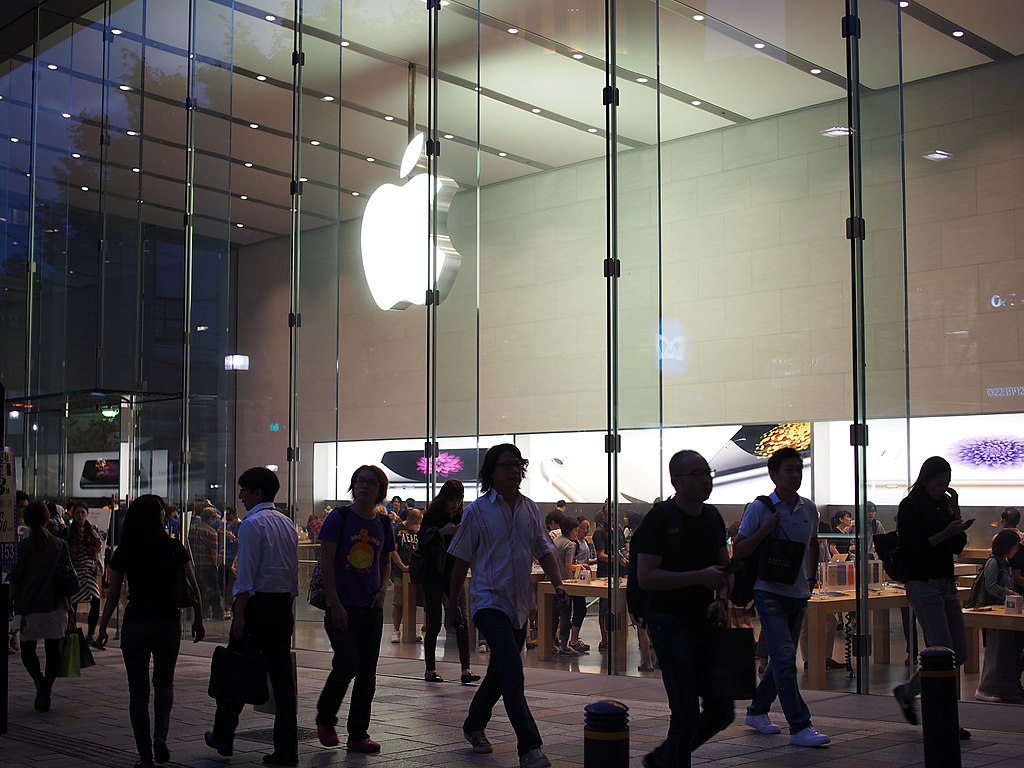Apple Inc. (NASDAQ:AAPL) experienced a weekend surge in iPhone sales as U.S. customers rushed to purchase devices ahead of an anticipated price increase triggered by President Donald Trump’s new trade tariffs on China, Bloomberg reported.
Employees from multiple Apple stores across the U.S. noted a spike in foot traffic, with many buyers citing concerns over looming price hikes. The tariffs, set to take effect April 9, impose a cumulative 54% duty on all Chinese imports—costs that U.S. importers are expected to pass on to consumers. With approximately 90% of iPhones manufactured in China, Apple's flagship product is at high risk of a price increase.
Although the pre-tariff buying spree may offer a short-term sales boost, analysts are uncertain how significantly this will affect Apple’s overall revenue. The company has been facing long-term challenges, including declining iPhone sales in key markets like China, driven by stiff competition and delays in launching artificial intelligence features.
Adding to investor concerns, President Trump warned of possible additional tariff hikes if China fails to meet U.S. demands, creating further uncertainty for companies like Apple that rely heavily on Chinese manufacturing.
Despite the recent sales rush, Apple shares have dropped nearly 18% over the past five days, reflecting investor anxiety over the broader impact of escalating trade tensions on future profitability.
As the April 9 deadline approaches, both consumers and investors are bracing for potential shifts in Apple’s pricing strategy and supply chain costs. The current scenario highlights the growing influence of global trade policy on tech sector performance and consumer behavior.



 Global PC Makers Eye Chinese Memory Chip Suppliers Amid Ongoing Supply Crunch
Global PC Makers Eye Chinese Memory Chip Suppliers Amid Ongoing Supply Crunch  OpenAI Expands Enterprise AI Strategy With Major Hiring Push Ahead of New Business Offering
OpenAI Expands Enterprise AI Strategy With Major Hiring Push Ahead of New Business Offering  SpaceX Pushes for Early Stock Index Inclusion Ahead of Potential Record-Breaking IPO
SpaceX Pushes for Early Stock Index Inclusion Ahead of Potential Record-Breaking IPO  Trump Backs Nexstar–Tegna Merger Amid Shifting U.S. Media Landscape
Trump Backs Nexstar–Tegna Merger Amid Shifting U.S. Media Landscape  Nvidia, ByteDance, and the U.S.-China AI Chip Standoff Over H200 Exports
Nvidia, ByteDance, and the U.S.-China AI Chip Standoff Over H200 Exports  SoftBank Shares Slide After Arm Earnings Miss Fuels Tech Stock Sell-Off
SoftBank Shares Slide After Arm Earnings Miss Fuels Tech Stock Sell-Off  American Airlines CEO to Meet Pilots Union Amid Storm Response and Financial Concerns
American Airlines CEO to Meet Pilots Union Amid Storm Response and Financial Concerns  FDA Targets Hims & Hers Over $49 Weight-Loss Pill, Raising Legal and Safety Concerns
FDA Targets Hims & Hers Over $49 Weight-Loss Pill, Raising Legal and Safety Concerns  Toyota’s Surprise CEO Change Signals Strategic Shift Amid Global Auto Turmoil
Toyota’s Surprise CEO Change Signals Strategic Shift Amid Global Auto Turmoil  Nvidia CEO Jensen Huang Says AI Investment Boom Is Just Beginning as NVDA Shares Surge
Nvidia CEO Jensen Huang Says AI Investment Boom Is Just Beginning as NVDA Shares Surge  Missouri Judge Dismisses Lawsuit Challenging Starbucks’ Diversity and Inclusion Policies
Missouri Judge Dismisses Lawsuit Challenging Starbucks’ Diversity and Inclusion Policies  Sony Q3 Profit Jumps on Gaming and Image Sensors, Full-Year Outlook Raised
Sony Q3 Profit Jumps on Gaming and Image Sensors, Full-Year Outlook Raised  TSMC Eyes 3nm Chip Production in Japan with $17 Billion Kumamoto Investment
TSMC Eyes 3nm Chip Production in Japan with $17 Billion Kumamoto Investment  Amazon Stock Rebounds After Earnings as $200B Capex Plan Sparks AI Spending Debate
Amazon Stock Rebounds After Earnings as $200B Capex Plan Sparks AI Spending Debate  Ford and Geely Explore Strategic Manufacturing Partnership in Europe
Ford and Geely Explore Strategic Manufacturing Partnership in Europe  Uber Ordered to Pay $8.5 Million in Bellwether Sexual Assault Lawsuit
Uber Ordered to Pay $8.5 Million in Bellwether Sexual Assault Lawsuit 































